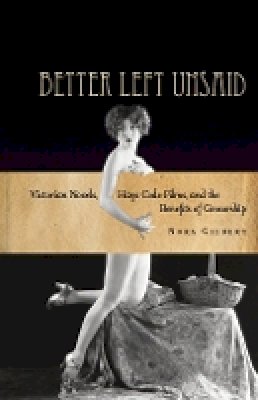
Stock image for illustration purposes only - book cover, edition or condition may vary.
Better Left Unsaid: Victorian Novels, Hays Code Films, and the Benefits of Censorship
Nora Gilbert
€ 122.60
FREE Delivery in Ireland
Description for Better Left Unsaid: Victorian Novels, Hays Code Films, and the Benefits of Censorship
Hardback. Taking two narrative genres that are generally presumed to have been stymied by the censor's knife--the Victorian novel and classical Hollywood film--this book reveals the varied ways in which censorship, for all its blustery self-righteousness, can actually be good for sex, politics, feminism, and art. Series: The Cultural Lives of Law. Num Pages: 200 pages, Illustrations. BIC Classification: JFMD. Category: (G) General (US: Trade). Dimension: 5487 x 3556 x 18. Weight in Grams: 363.
Better Left Unsaid is in the unseemly position of defending censorship from the central allegations that are traditionally leveled against it. Taking two genres generally presumed to have been stymied by the censor's knife—the Victorian novel and classical Hollywood film—this book reveals the varied ways in which censorship, for all its blustery self-righteousness, can actually be good for sex, politics, feminism, and art.
As much as Victorianism is equated with such cultural impulses as repression and prudery, few scholars have explored the Victorian novel as a "censored" commodity—thanks, in large part, to the indirectness and intangibility of England's literary ... Read more
Show LessProduct Details
Format
Hardback
Publication date
2013
Publisher
Stanford University Press United States
Number of pages
200
Condition
New
Series
The Cultural Lives of Law
Number of Pages
200
Place of Publication
Palo Alto, United States
ISBN
9780804784207
SKU
V9780804784207
Shipping Time
Usually ships in 15 to 20 working days
Ref
99-15
About Nora Gilbert
Nora Gilbert is Assistant Professor of English at the University of North Texas.
Reviews for Better Left Unsaid: Victorian Novels, Hays Code Films, and the Benefits of Censorship
"Gilbert makes her case persuasively and elegantly. To use a term central to her discussion, her sophisticated analysis not only draws on a range of theoretical contexts and discourses, but offers much of value to readers from a range of disciplines and backgrounds, from film and cultural studies to law. Most valuably, Gilbert challenges us to rethink censorship as an ... Read more
